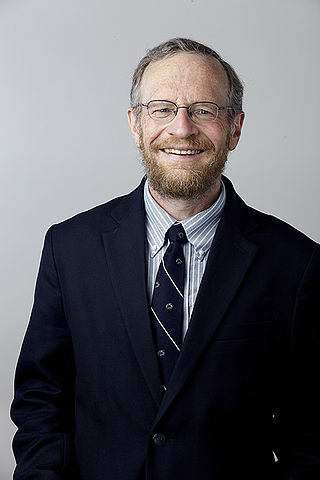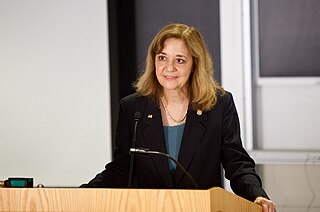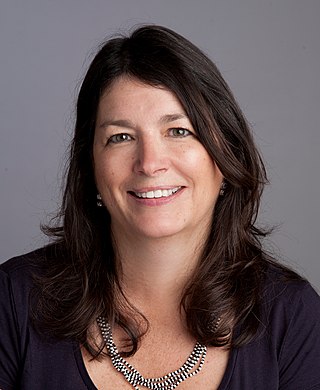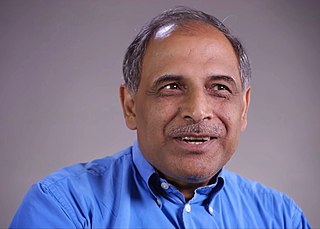Related Research Articles
Sir Nicholas John Shackleton was an English geologist and paleoclimatologist who specialised in the Quaternary Period. He was the son of the distinguished field geologist Robert Millner Shackleton and great-nephew of the explorer Ernest Shackleton.
Daniel Paul Schrag is the Sturgis Hooper Professor of Geology, Professor of Environmental Science and Engineering at Harvard University and Director of the Harvard University Center for the Environment. He also co-directs the Science, Technology and Public Policy Program at the Belfer Center for Science and International Affairs at the Harvard University Harvard Kennedy School. He is also an external professor at the Santa Fe Institute.

Naomi Oreskes is an American historian of science. She became Professor of the History of Science and Affiliated Professor of Earth and Planetary Sciences at Harvard University in 2013, after 15 years as Professor of History and Science Studies at the University of California, San Diego.

Richard Blane Alley is an American geologist and Evan Pugh Professor of Geosciences at Pennsylvania State University. He has authored more than 240 refereed scientific publications about the relationships between Earth's cryosphere and global climate change, and is recognized by the Institute for Scientific Information as a "highly cited researcher."
William Richard Peltier, Ph.D., D.Sc. (hc), is university professor of physics at the University of Toronto. He is director of the Centre for Global Change Science, past principal investigator of the Polar Climate Stability Network, and the scientific director of Canada's largest supercomputer centre, SciNet. He is a fellow of the Royal Society of Canada, of the American Geophysical Union, of the American Meteorological Society, and of the Norwegian Academy of Science and Letters..
David A. Hodell, FRS is a British–American geologist and paleoclimatologist. In October 2008, Hodell was appointed to the position of Woodwardian Professor of Geology at the University of Cambridge in the United Kingdom, where he is also a fellow of Clare College. He is a dual citizen of the United Kingdom and the United States. He is also the Director of the Godwin Laboratory for Palaeoclimate Research. Previously, he taught at the University of Florida from 1986–2008, earning the rank of full professor in geological sciences. Hodell was also the director of the Stable Isotope Laboratory from 1996–2008. Hodell earned his Ph.D. in 1986 in oceanography from the Graduate School of Oceanography, University of Rhode Island after earning his bachelor of arts in 1980 in geology from the University of Vermont.

Rosina M. Bierbaum is currently the Roy F. Westin Chair in Natural Economics and Research Professor at the University of Maryland's School of Public Policy. She is also a professor and former dean at the University of Michigan School of Natural Resources and Environment (SNRE). She was hired in October 2001, by then-University of Michigan President, Lee Bollinger. She is also the current Chair of The Scientific and Technical Advisory Panel (STAP) that provides independent scientific and technical advice to the GEF on its policies, strategies, programs, and projects.

Eugenia Enriqueta Kalnay is an Argentine meteorologist and a Distinguished University Professor of Atmospheric and Oceanic Science, which is part of the University of Maryland College of Computer, Mathematical, and Natural Sciences at the University of Maryland, College Park in the United States.

Maureen E. Raymo is an American paleoclimatologist and marine geologist. She is the Co-Founding Dean Emerita of the Columbia Climate School and the G. Unger Vetlesen Professor of Earth & Environmental Sciences at Columbia University. From 2011 to 2022 she was also Director of Lamont-Doherty Earth Observatory's (LDEO) Core Repository and, until 2024, was the Founding Director of the LDEO Hudson River Field Station. From 2020 to 2023 she was first Interim Director then Director of Lamont-Doherty Earth Observatory, the first climate scientist and first female scientist to head the institution.
Ellen Mosley-Thompson is a glaciologist and climatologist. She is a Distinguished University Professor at Ohio State University and director of their Byrd Polar and Climate Research Center. She is known as a pioneer in the use of ice cores from the Polar Regions for paleoclimatic research and is an influential figure in climate science. She is an elected fellow of the American Association for the Advancement of Science, the American Geophysical Union and an elected member of the National Academy of Sciences.

Martha Elizabeth Pollack is an American computer scientist who has served as the 14th president of Cornell University since April 2017. Previously, she served as the 14th provost and executive vice president for academic affairs of the University of Michigan from 2013 to 2017.

Robin Elizabeth Bell is Palisades Geophysical Institute (PGI) Lamont Research Professor at Columbia University's Lamont–Doherty Earth Observatory and a past President of the American Geophysical Union (AGU), 2019–2021. Dr. Bell was influential in co-ordinating the 2007 International Polar Year and was the first woman to chair the National Academy of Sciences Polar Research Board. She has made numerous important discoveries with regard to subglacial lakes and ice sheet dynamics, and has a ridge, called Bell Buttress, in Antarctica named after her.
John Thomas Andrews is a British-American geologist and professor emeritus of geological and atmospheric and oceanic sciences at the University of Colorado Boulder's Institute of Arctic and Alpine Research (INSTAAR), in Boulder, Colorado, USA.
Joel D. Blum is a scientist who specializes in isotope geochemistry and environmental geochemistry. He is currently a professor of Earth and Environmental Sciences at the University of Michigan and an elected member of the National Academy of Sciences. Blum has several named professorships including the John D. MacArthur, Arthur F. Thurnau and Gerald J. Keeler Distinguished Professorship. Blum is a past Co-Editor- in-Chief of Chemical Geology and Elementa, and is the current Editor-in-Chief of the American Chemical Society journal Earth and Space Chemistry.

James Zachos is an American paleoclimatologist, oceanographer, and marine scientist. He is currently a professor in the Department of Earth and Planetary sciences at University of California, Santa Cruz where he was elected to the National Academy of Sciences in 2017. His research focuses on the biological, chemical, and climatic evolution of late Cretaceous and Cenozoic oceans, and how past climatic conditions help improve forecasts of the consequences of anthropogenic carbon emissions on future climate change.
Eric Steig is a Canadian-American scientist specializing in polar climate, glaciology, isotope geochemistry, and ice core science.
Natalie Mahowald is an American Earth scientist who is the Irving Porter Church Professor of Engineering at Cornell University. Her research considers atmospheric transport of biogeochemically-relevant species, and the impact of humans on their environments.
Jean Lynch-Stieglitz is a paleoceanographer known for her research on reconstructing changes in ocean circulation over the last 100,000 years.
Gifford H. Miller is an American paleoclimatologist. He is a Distinguished Professor in the Institute of Arctic and Alpine Research at the University of Colorado Boulder.

Upmanu Lall is an Indian-American engineer and founding director of the Water Institute at the Julie Ann Wrigley Global Futures Laboratory at Arizona State University. Lall also has a faculty appointment as professor in the School of Complex Adaptive Systems within the College of Global Futures. Prior to joining ASU in January 2024, Lall was the Alan and Carol Silberstein Professor of Engineering at Columbia University. He served as founding director of the Columbia Water Center. Lall studies how to solve water scarcity and how to predict and mitigate floods. In 2014, he was awarded the Henry Darcy Medal by the European Geosciences Union. He was named an American Geophysical Union Fellow in 2017 and their Walter Langbein Lecturer in 2022. He was elected a fellow of the American Association for the Advancement of Science in 2018, and has received the Arid Lands Hydrology and the Ven Te Chow Awards from the American Society of Civil Engineers. In April 2021 he was named to the “Hot List of the world’s 1,000 top climate scientists” by Reuters.
References
- 1 2 3 Ian Sample. A World Without Ice by Henry Pollack – review, The Guardian , 20 October 2010.
- ↑ Betty Galbraith. Book Review -- Henry N. Pollack: A world without ice, The Environmentalist , 7 September 2010.
- ↑ Veronique Greenwood. The Environmental Revival Seed , October 27, 2009.
- ↑ M.G. Morgan. Review: Uncertain Science ... Uncertain World Climatic Change , Volume 65, Numbers 1-2, 243.
- 1 2 3 "Henry N. Pollack CV" (PDF). University of Michigan . Retrieved 2023-04-12.
- ↑ "Elected fellows". American Association for the Advancement of Science . Retrieved 2023-04-12.
- ↑ "Fellow: Henry N Pollack". American Geophysical Union . Retrieved 2023-04-12.
- ↑ "All active and current fellows". Geological Society of America . Retrieved 2023-04-12.